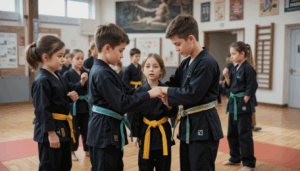This article was last updated on July 29, 2025

The environment of a brand-new year can wind us up with hope, leading us to big new promises, such as adults wanting to work out every day, save cash, or drop a few pounds. But isn’t it easy to fall off the wagon when we’re just thinking big without any actual action plan? Often, kids watch us ditch these goals. What if, instead, we could help kids set fun and easy-to-do goals, perfect for where they’re at in growing up? This simple guide with clever tips and brainy science ideas might help your child learn great life skills.
Why Do Goals Matter for Kids Growing Up?
Did you know goals help kids get better at thinking, staying in control, and bouncing back when things get tough? According to the super-smart folks at the Harvard Center on the Developing Child, winning first little challenges can make parts of the brain better at making plans and solving problems. When a child feels “small wins,” a brain chemical (dopamine) tells us those efforts are worth it by making us feel good. Isn’t that neat?
How to Help Kids Set Goals That Make Sense for Their Age
Preschool (3–5 years)
Stick to the senses with tasks they can see and feel right now:
• “Put toys in the bin after playtime”
• “Try one new vegetable this week”
Use visual trackers like sticker charts. Keep it short to stop them from getting upset, while learning what happens if they do it.
Elementary (6–9 years)
Try simple goals each week with easy-to-check results:
• “Read 20 minutes daily”
• “Play piano for 15 minutes, 4 times a week”
What about picking a family activity they love to do as a prize? It’s big at the American Academy of Pediatrics—not gifts or stuff.
Tweens (10–13 years)
Encourage them to try skill-based goals with a friend:
• “Join one school club this semester”
• “Save cash for 3 months to get a bike”
Studies show social check-ins help them follow through with their goals at this bright age.
Teens (14+ years)
Let them set their own longer-term goals:
• “Volunteer for 10 hours every month at an animal shelter”
• “Improve math grade from B to A- by semester’s end”
The Society for Learning in Child Growth suggests teen goal-setting helps them explore their own identity and think about what’s ahead. What do you think?
How Can You Help as a Parent? Offer a Hand, Don’t Be the Boss
- Go With Their Interests: Don’t just pick goals for them; ask, “What’s something you think is cool or want to get better at?” Doing what they want makes them more motivated.
- Break Things Up: Help them break big dreams into small, manageable steps. Want a puppy? They can learn about dogs, write down what they need money for, and do chores to show they’re ready.
- Watch the Steps: You both can use checklists, small diaries, or apps like Habitica.
Navigating Setbacks & Building Resilience
When goals stall:
• Normalize Struggle: Share age-appropriate stories of your own challenges.
• Pivot, Don’t Quit: Adjust timelines or methods. Failed to save allowance? Discuss budgeting tweaks.
• Celebrate Effort: Say, “Wow, you practiced every day and you’re doing great!” more often.
Overcoming bumps is good. A helpful review in Child Development Viewpoints says that kids who solve their problems show more school smarts and people skills down the road. What about you? How do you help yours dream big and go their own way? What new step might we try next?
Success Stories: Life SKILLS in Action
Chris Gehring’s Life SKILL program, integrated with Inspire Martial Arts, exemplifies this approach. Students set belt-level goals broken into weekly skills. A 7-year-old might aim to master three kicks in a month, while a teen plans leadership projects. Age-banded curricula ensure relevance:
• Little Dragons (3–6): Focus on following instructions and taking turns
• Juniors (7–12): Build teamwork through partner drills
• Teens (13+): Develop mentorship via assistant teaching
Parents report improved focus and responsibility. As one noted, “Tracking progress on the dojo’s goal ladder showed my son that small steps create big changes.”
The Lasting Impact
Children who set regular goals gain more than achievements—they build self-efficacy. The American Psychological Association links childhood goal-setting to adult competencies like time management and grit. By celebrating effort over outcomes, we teach them that growth is the real victory.
Inspire Martial Arts integrates these principles into its Life SKILL program. Learn about their North Royalton childhood development programs.
References & Further Reading:
- Harvard Center on the Developing Child: Executive Function & Self-Regulation
- American Academy of Pediatrics: Rewards & Motivation
- Society for Research in Child Development: Adolescent Goal-Setting
- Child Development Perspectives Study: Resilience Through Problem-Solving
- APA on Self-Efficacy: Building Competence in Children






